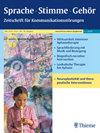在临床社会儿科样本中关于mot动物试验的信心和合法性的报告
IF 0.2
Q4 Health Professions
引用次数: 6
摘要
背景:motier测试(一种非单词重复测试)被认为是测量语音短期记忆和音素分化的测试。虽然它在德语国家被广泛使用,但很少有关于其可靠性和有效性的数据被公布。方法:收集某社区精神卫生服务机构(社会儿科中心)在常规临床诊断条件下的资料,进行早期诊断和早期干预。对322名被诊断患有发育障碍、言语和语言障碍、行为障碍或情感障碍的儿童(4-15岁)进行了motier测试。除了ICD-10诊断和社会人口学变量外,还评估了智力(K-ABC, SON-R 2S-7, WPPSI)和语音加工的各个方面。为67名儿童样本建立了重测信度。结果:信度系数范围为0.79 ~ 0.88。与所有语音加工测量的相关性是显著的(低到中等效应量)。不同临床组间的差异效度支持了motier检验的效度,其中听觉障碍患儿得分最低。主要支持与智力相比较的判别效度。motier测试成绩与SON-R 2S -7和WPSSI(德语适应)语言和表现量表的IQ不相关,但与K-ABC心理加工量表呈正相关。在回归分析中,只有顺序处理对motier测试成绩的预测有显著贡献,而同时处理和成就对motier测试成绩的预测没有显著贡献。结论:信度和效度数据支持motier测试在识别需要更详细的听觉感知评估的儿童方面的潜力。然而,需要一个具有代表性和最新标准化的motier测试。本文章由计算机程序翻译,如有差异,请以英文原文为准。
Befunde zur Reliabilität und Validität des Mottier-Tests in einer klinisch-sozialpädiatrischen Stichprobe
BACKGROUND: The Mottier-test (a test of nonword repetition) is supposed to measure phonological short-term memory and differentiation of phonemes. Although it is widely used in german-speaking countries, few data on its reliability and validity have been published. METHOD: Data were gathered under routine conditions of clinical diagnosis in a community mental health service (social pediatric center) for early diagnosis and early intervention. The Mottier-test was administered to 322 children (aged 4-15 years) diagnosed with developmental disabilities, speech and language impairments, behavior disorders, or affective disorders. In addition to ICD-10 diagnoses and socio-demographical variables, intelligence (K-ABC, SON-R 2S-7, WPPSI) and various aspects of phonological processing were assessed. Retest reliability was established for a sample of 67 children. RESULTS: Reliability coefficients ranged from .79 to .88. Correlations with all measures of phonological processing were significant (low to moderate effect sizes). The validity of the Mottier-test was supported by its differential validity for different clinical groups, children with auditory perception disorders obtaining the lowest scores. Discriminative validity compared to intelligence was mainly supported. Mottier-test scores were unrelated to IQ as measured by SON-R 2S -7 and WPSSI (german adaptation) verbal and performance scales, but correlated positively with the K-ABC mental processing scale. In regression analysis, only sequential processing - but not simultaneous processing and achievement - contributed significantly to the prediction of Mottier-test scores. CONCLUSIONS: Data on reliability and validity support the potential of the Mottier-Test to identify children who are in need of a more detailed assessment of auditory perception. However, a representative and up to date standardization of the Mottier-test is required.
求助全文
通过发布文献求助,成功后即可免费获取论文全文。
去求助
来源期刊

Sprache-Stimme-Gehor
医学-耳鼻喉科学
CiteScore
0.40
自引率
20.00%
发文量
62
审稿时长
>12 weeks
期刊介绍:
Sprache · Stimme · Gehör ist die Fachzeitschrift für alle, die sich mit Sprach-, Stimm- und Hörstörungen beschäftigen – von Logopäden über Phoniater/Pädaudiologen bis hin zu Sprachheilpädagogen oder Hörgeschädigtenpädagogen. Sie vermittelt gesicherte medizinische Fakten für Ihre Fortbildung – maximaler Praxisnutzen, größtmögliche Unterstützung in Ihrem Alltag und der berühmte Blick über den Tellerrand sind unsere Ziele.
 求助内容:
求助内容: 应助结果提醒方式:
应助结果提醒方式:


